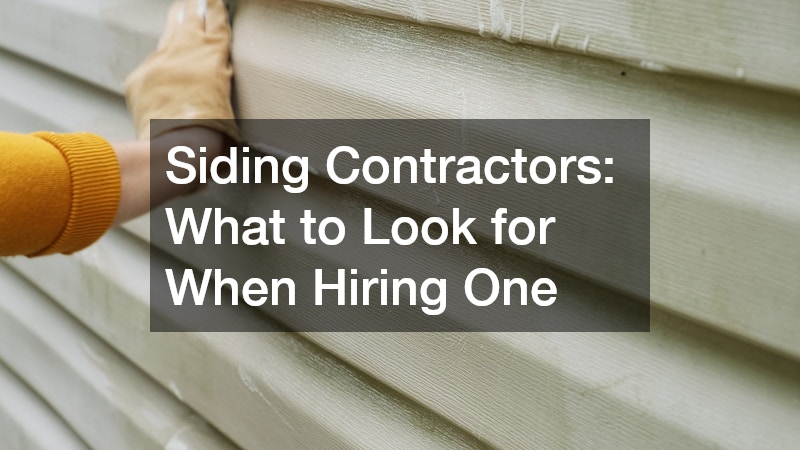Assessing Professional Credentials and Experience
The first step when considering siding contractors is to assess their professional credentials and experience. Ensure that the contractor holds the necessary licenses and certifications required by your state or locality. This validates their capability to perform the job in compliance with regulatory standards.
Experience plays a crucial role, as contractors who have been in the industry for several years are more likely to deliver quality workmanship. Ask potential contractors about their past projects and request references to gauge their reliability and skill set.
An experienced siding contractor will possess a deep understanding of different siding materials and installation techniques. They will be familiar with common issues that may arise during installation and have the expertise to resolve them efficiently. Moreover, seasoned contractors are more adept at navigating unexpected challenges, reducing the likelihood of project delays. During your initial consultations, inquire about previous projects similar to yours to understand how prepared they are to tackle your specific needs. A contractor’s level of experience can significantly impact the longevity and overall success of your siding project.
Evaluating Communication and Professionalism
Effective communication is pivotal to any successful siding project. From the initial inquiry stage to project completion, the contractor should maintain clear and open communication regarding timelines, costs, and any potential issues. Assess how promptly they respond to your queries and how thoroughly they address your concerns, as this speaks volumes about their professionalism. During preliminary discussions, take note of how well the contractor listens to your requirements and provides input on the best solutions. A two-way dialogue not only ensures alignment on project expectations but also enhances trust.
Professionalism goes hand in hand with communication. Evaluate a contractor’s punctuality, presentation, and ability to provide a detailed, written estimate for the work. A professional contractor should be respectful of your property, ensuring minimal disruption to your home environment during the course of their work. They should provide a safe working environment and adhere to all necessary safety protocols. Consider whether the contractor is willing to answer questions, offer insights, and present themselves professionally throughout the entire engagement.
Examining Material and Warranties Offered
The choice of siding materials offered by a contractor is a crucial consideration, as it affects both the look and durability of your home’s exterior. Discuss the types of siding available, such as vinyl, wood, fiber cement, or metal, and their respective pros and cons. The contractor should not only be able to provide a variety of options but also recommend the best-suited materials for your specific style, climate, and budget. An informed decision on materials can save you maintenance costs in the long run. A reputable siding contractor will guide you through making a selection that balances aesthetics, performance, and cost-effectiveness.
Understanding Pricing and Getting Detailed Quotes
Pricing is one of the most critical factors when selecting a siding contractor, and comparing quotes from multiple contractors can help you gauge the market rate. Ensure that each quote you receive is detailed, itemizing costs for materials, labor, and any additional services. Beware of quotes that seem unusually low, as they might indicate subpar materials or workmanship. The best contractors are those who offer competitive pricing without compromising on quality. They should be willing to discuss the breakdown of costs comprehensively, ensuring there are no hidden fees.
A detailed quote should also include estimated project timelines and payment schedules. Understanding when certain milestones are to be met and when payments are due prevents misunderstandings and helps with budgeting. The contractor’s willingness to accommodate your financial constraints or propose flexible payment options can be a significant plus. Always verify that all aspects of the agreement are documented in writing to prevent potential disputes. A transparent financial agreement underscores a contractor’s trustworthiness and integrity.
Verifying Insurance Coverage
Insurance is an often-overlooked but crucial component when hiring a siding contractor. Proper insurance coverage protects both you and the contractor in the event of accidents, injuries, or property damage during the course of the project. Request proof of both general liability and workers’ compensation insurance before any work commences. This ensures you are not held liable for any unfortunate incidents that may occur. A responsible contractor will have no reservations about providing their insurance certificates for your reference.
Understanding the extent of the contractor’s insurance policies is essential for your own protection. General liability insurance should cover any damages to your property resulting from the contractor’s work, while workers’ compensation insurance is a legal requirement in many areas, protecting workers who may be injured on the job. A contractor lacking adequate insurance might present a red flag for safety negligence or potential legal challenges. Verifying insurance is a vital step that many homeowners overlook, yet it plays a key role in safeguarding your home and financial interests.


